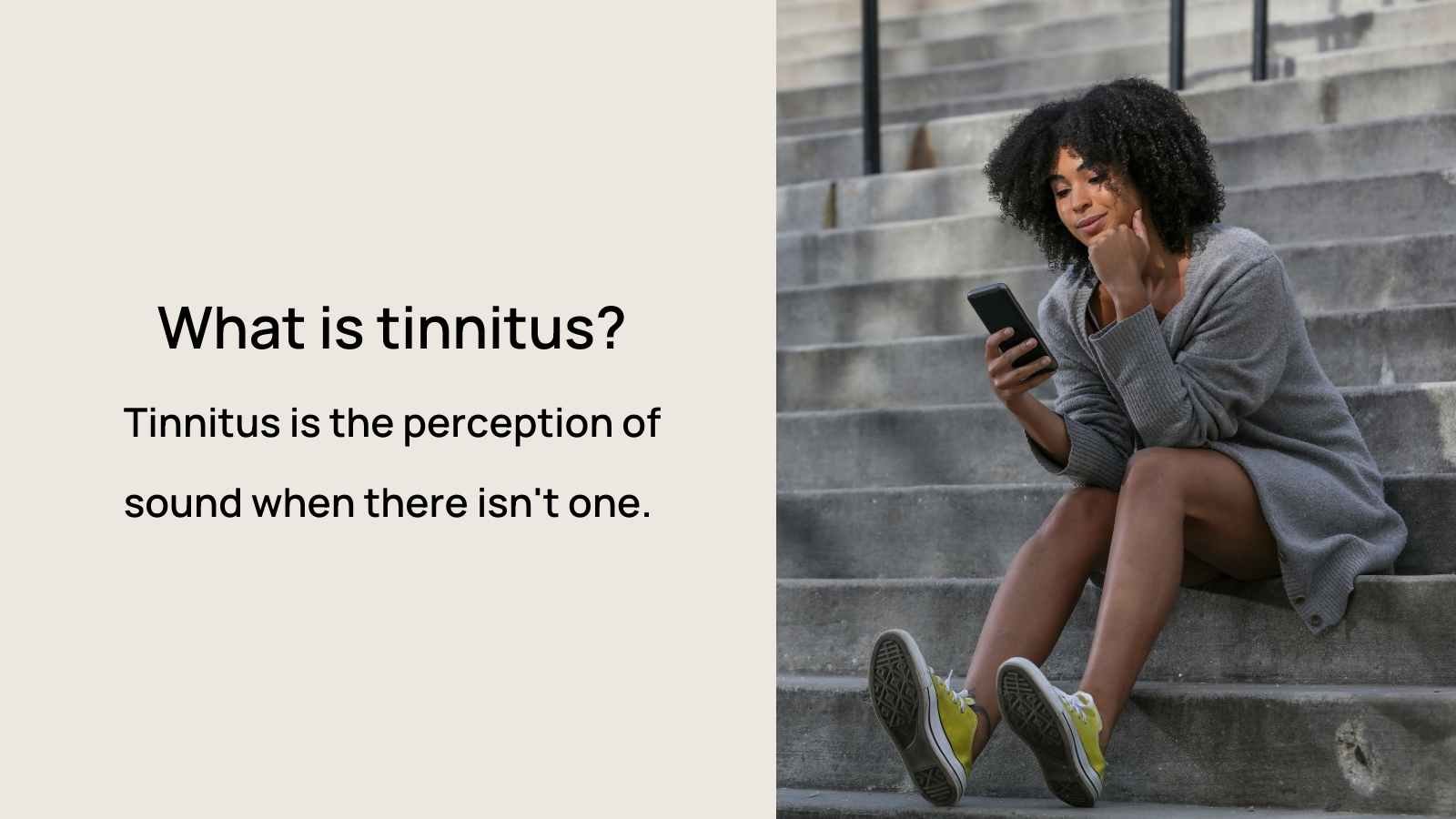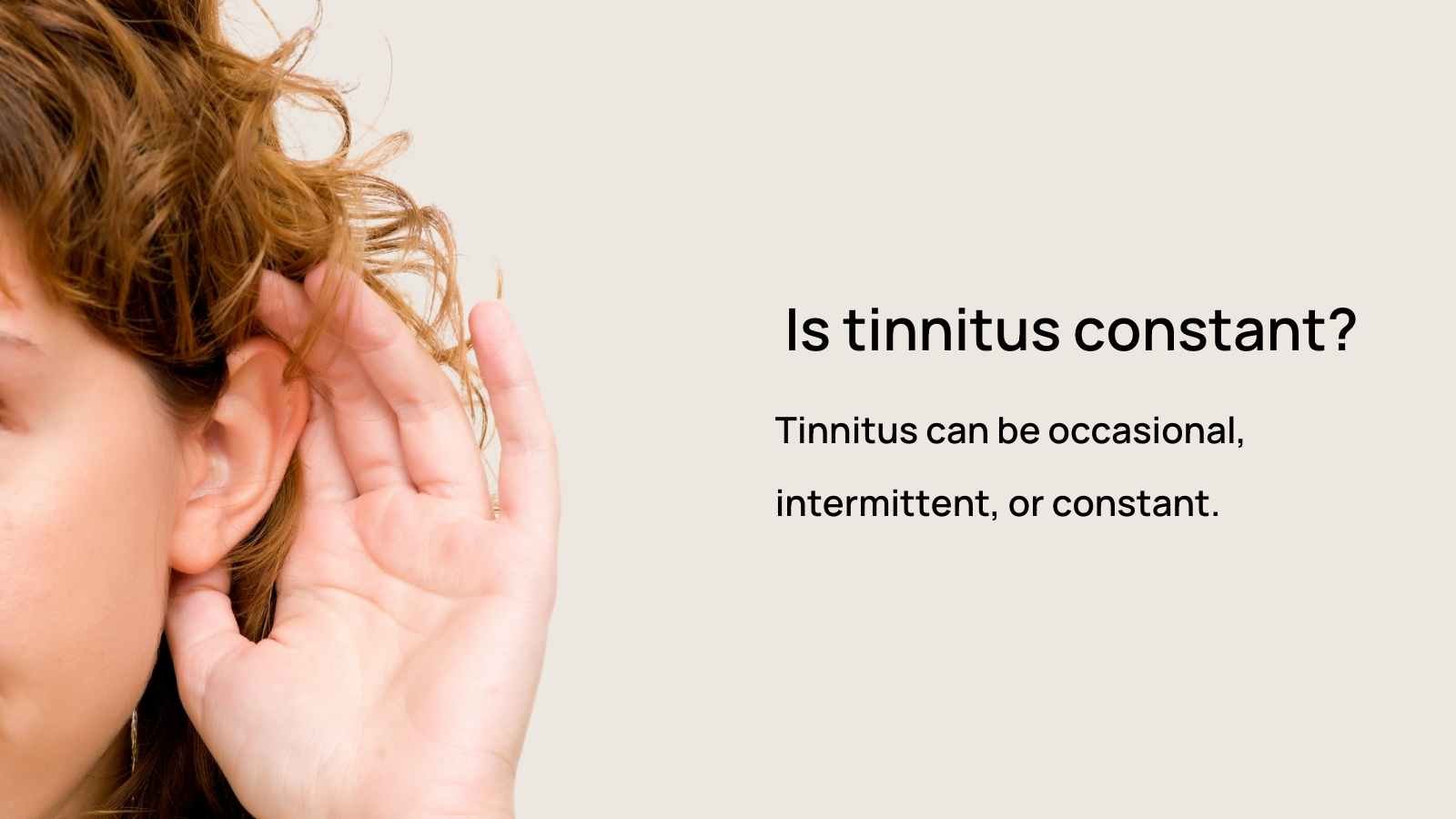Tinnitus is a common problem that affects millions of people. As an audiologist, I work with many people who have tinnitus.
People often refer to tinnitus as "ringing in the ears," but I've worked with many patients who report that tinnitus sounds different from ringing. (FYI: Tinnitus can present as different sounds or auditory experiences.) For example, some say it sounds like humming, buzzing, chirping, crickets, or clicking in the ears.
Although tinnitus is often associated with hearing loss, it can have other causes and also affect those with normal hearing. Moreover, the volume and frequency can vary from person to person.
Keep scrolling and read through our comprehensive guide on what tinnitus sounds like, including examples of different types, and how they affect people.
What is tinnitus?

Tinnitus is the perception of sound when there isn't one. Patients sometimes tell me stories of when they first experienced tinnitus, discovering that the sound wasn't coming from somewhere in the room but rather from their head.
For example, one patient described sitting in his quiet living room while noticing the sound. He got up and walked around, looking for its source.
Then, realizing there wasn't an alarm or other noise and no one else could hear the sound, he determined the sound's source was inside his head. On its own, tinnitus is just a symptom and it's a sound that is generated by the brain.
Is tinnitus constant?

Some experience tinnitus intermittently or occasionally, while others find that it doesn't let up at all. Tinnitus can happen unilaterally or bilaterally, and some patients also report tinnitus in both ears but each ear may hear something slightly different. Just as each person's experience of tinnitus differs, people also experience its impact on their lives differently; some find its presence benign, while others find it very bothersome. If you're looking for ideas on managing tinnitus, read more about some at-home solutions here.
Most Common Tinnitus Sounds

There are various types of tinnitus, and the sounds heard can vary depending on the person experiencing the condition. Some of the most common tinnitus sounds include:
- Ringing
- Buzzing
- Crickets
- Static
- Whistling (Tea Kettle Sounds)
- Electrical Noise
- Humming
Ringing
One of the most common types of tinnitus is a high-pitched ringing sound. Many patients with high-frequency hearing loss experience tinnitus at the frequency of their hearing loss.
Buzzing
Tinnitus can also sound like buzzing. For example, some patients liken the sound to bees or other insects.
Crickets
Like buzzing, some patients report that their tinnitus sounds like a summer night when the cicadas are chirping or the cacophony of crickets.
Static
People sometimes describe this type of tinnitus as similar to white noise, a radio between stations, or the sound an old television used to make after being turned off.
Whistling (Tea Kettle Sounds)
Patients may describe whistling as similar to a tea kettle or dog whistle. It can be a very high-pitched, jarring, and piercing sound.
Electrical Noise
Imagine hearing that sound in your ear if you've ever been near a power plant or electrical power line. Some patients report that their tinnitus sounds a lot like that sound.
Humming
Tinnitus can also sound like humming. Patients describe this as a humming from within their head or sometimes even sounds like it is coming from outside the room. Listening to a humming sound here.
Other Notable Tinnitus Perceptions

Tinnitus can have many different qualities and sound perceptions. While less common, some of these include:
- Pulsatile Tinnitus
- Music Ear
- Voices
- Clicking
Clicking
Another type of tinnitus is clicking, often heard like someone clicking their tongue. Clicking tinnitus can occur due to muscle spasms in the ear, jaw, or neck muscles. Listen to clicking sounds here.
Pulsatile Tinnitus
Another type of tinnitus is pulsatile tinnitus, which sounds like a heartbeat or pulsing sensation in the ears. People with pulsatile tinnitus can generally hear their heartbeat or the blood rushing through their veins. This type of tinnitus is less common and should be medically evaluated. Some patients are anatomically more predisposed to audible pulsatile tinnitus. However, pulsatile tinnitus is worth evaluating, as it can have vascular etiology. Listen to pulsatile tinnitus sounds here.
Musical Ear
Musical ear syndrome is another form of tinnitus that is less common but affects some individuals who have lost their hearing. People with this type of tinnitus report hearing music in their head, often songs they haven't heard in years or even unfamiliar melodies. In my experience, patients often hear songs they remember from childhood or other instrumental melodies. The music can be distracting and disrupts their daily activities. Watch a video on musical ear syndrome here.
Voices
Like musical ear syndrome, patients sometimes hear music with lyrics or other sounds resembling voices. In my experience, this is more common with patients with more severe hearing loss, but it can also have other causes. To note, tinnitus that resembles voices is less common. Please see a physician and discuss your symptoms if you have concerns about hearing voices.
Conclusion
Tinnitus can present in different types and sounds, and the severity can depend on the person's situation. If you find the sound of your tinnitus bothersome, try at-home remedies for tinnitus, including using white noise machines and mindfulness practices. If you or someone you know is experiencing tinnitus, it is best to consult a healthcare professional to address the underlying cause and manage the condition. The good news is that many people with tinnitus find ways to manage it and prevent negative impacts on their lives.






